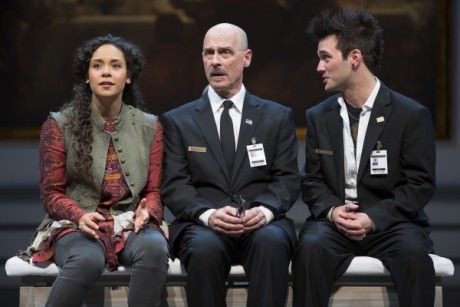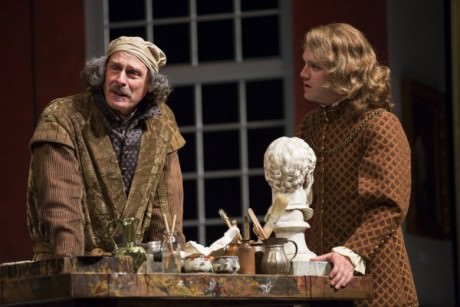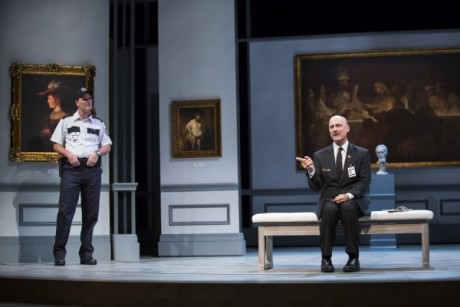Only through art do we become immortal. The Guard, commissioned by Ford’s Theatre for the Women’s Voices Theater Festival, is an original work by playwright Jessica Dickey. Jessica Dickey and The Guard are recipients of the National Theatre Conference’s 2015 Barrie and Bernice Stavis Award, an award celebrating outstanding emerging playwrights.
The play plumbs existential depths from a simple premise: the eponymous guard is a museum guard, and the setting begins with, well, a museum. The beginning scenic design, by James Kronzer, should be familiar to those from museum-rich Washington: the museum room’s walls lined with large paintings, hung with deliberate precision; the room itself colored in subdued blues and whites; the guard standing steady in a corner of the room. But who is the guard? We tend to overlook these people in museums, pausing to notice them only when they impede our passage to the next room or caution us to put away our cameras. Ms. Dickey explores this man, as she notes in the playbill, on a “journey to discover the secret world of the people who protect the great works we hold dear.” This is one thing the play is about: the richness of not only museum guards, but of all of those people in our lives that we overlook – Metro agents, store clerks, and bartenders. Whomever they are, they are everywhere, and they have lives replete with troubles and joys of their own.
We see the museum as not just a place for appreciating art from the outside, but as a workplace and living community. There is a hierarchy within the community – Henry is joined by two colleagues, one a different type of security guard – the kind with guns – played to macho humor by Tim Getman, and another colleague Dodger (played by Josh Sticklin). It’s Dodger’s first day, and he is idealism, youth, perhaps a bit of ambition that is misplaced in the sacred space.

For Mitchell Hébert who plays Henry, the guard, views his role as a guardian – not just of the art, but of the space, of the relationship that people have to art, of the blurriness between that which is created and that which is lived. Each encounter with an object of beauty is evocative of something different, even though “the painting is exactly the same/ it’s you that’s different.” Henry’s relationship to the possibilities of art and Dodger’s youthful promise are blended in the character of Madeline, played earnestly by Kathryn Tkel, an art student in the museum whom we learn has deep sorrow and pain of her own to share, who seeks solace and meaning in the museum.
Together, these characters observe the Rembrandt painting Aristotle with a Bust of Homer. They long to touch and to understand the painting. They wonder what Rembrandt was thinking and debate whether the painting is Aristotle or another philosopher. The play shifts in scope – both literally and figuratively. The set rotates: we see Rembrandt’s studio, the light of a waning day falling upon his workspace (notable lighting designed by Rui Rita). Here, too, the painters’ studio is a living place; it is where a man works, and it is also where a man talks to his wife and argues with his son. It is where a man complains about his boss and expresses existential despair: we are all paintings, never fulling understanding each other, seeing surfaces and gathering our own meanings about what we see.

Surprise – the scene shifts again, leading us further deeper into layers of meta-meaning. Just as the people in the museum contemplate Rembrandt, Rembrandt contemplates Aristotle and Homer, and Homer contemplates his own existence. Homer, played by Craig Wallace, is, as it turns out, another man “who shit[s] in a pot…this will never change.” This is the other thing, the more important thing, the harder thing to capture, that this play is about: every person at every time has lived, slept, died, and feared his own impermanence. We see, through the long lens of history, that immortality is possible – Homer, Aristotle, and Rembrandt have been seared into our collective minds throughout time. So too, however, are the everyday people, the guards, in their own way: though the characters wrestle with grief, with the cold fact of death, they live too with memories, with the quiet immortality of their loved ones. Homer’s memories of his wife; Henry’s of his father, of his partner Simon; Madeline’s of her grandmother – these people are real and they are immortal, just as the playwright Dickey will be for this brilliant contribution to the history of theater.

Sharon Ott has directed a very fine production. The play is particularly fitting for its setting: Ford’s Theatre, itself a venue of living history and immortality. We need not worry so much about our imprint in history: as President Lincoln shall live on, so shall we all.
Running Time: 90 minutes, with no intermission.
The Guard plays through October 18, 2015, at Ford’s Theatre – 511 10th Street, NW in Washington, DC. For tickets, call the box office at (800) 982-2787, or purchase them online.





